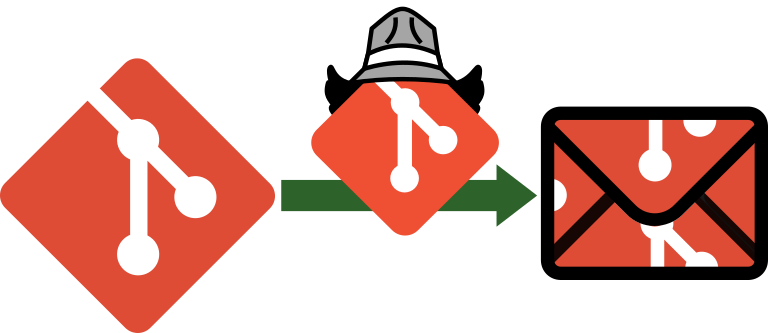 GitGitGadget
GitGitGadgetContributing git.git patches via GitHub PRs
... one iteration at a time...
The essence of GitGitGadget can be illustrated by this diagram
Of course, when adding a couple of details, it gets quite a bit more complicated. For example, GitGitGadget needs write permissions on the pr-repo, to push the tagged patch series, and to store its state in Git notes. Most upstream projects do not like that, and therefore GitGitGadget works on a pr-repo which is a fork of an upstream-repo. However, a read-only variant of GitGitGadget’s GitHub App can be installed on the upstream-repo, in which case GitGitGadget does handle PRs in the upstream-repo but the state and the tagged patch series still live in pr-repo.
For testing purposes, there can also be test-repo, another fork of upstream-repo (but only the owner of the test-repo is allowed to use GitGitGadget there).
GitGitGadget also needs access to the mailing list in the form of a public-inbox repository, to be able to mirror replies back to the PRs.
GitGitGadget is implemented as a GitHub App (with the very imaginative name “GitGitGadget”), which means that a webhook is called on certain events, such as new PR comments on PRs (e.g. issue_comment).
In GitGitGadget’s case, this webhook is implemented as an Azure Function.
Apart from validating that the payload really originated from GitHub, the Azure Function performs a rudimentary check whether the comment (if it was triggered by a comment) contains a command that GitGitGadget should act on, and depending on that check triggers the handle-pr-comment GitHub workflow, which creates a Check Run that is shown in the Checks tab of the PR.
The push event (and also the pull_request event) is also handled by the Azure Function, triggering the handle-pr-push GitHub workflow, which creates a Check Run that is shown in the Checks tab of the PR.
Either workflow calls one of GitGitGadget’s GitHub Actions, which are very thin wrappers around the CIHelper class that implements the core logic.
This is performed by the handle-new-mails GitHub workflow. It calls the handle-new-mails GitHub Action, which is a very thin wrapper around the CIHelper class that implements the core logic. The workflow runs are triggered by updates to the main branch of GitGitGadget’s mirror of the Git mailing list archive, thanks to GitGitGadget’s GitHub App reacting to the corresponding push event.
The PRs labels are updated, and the comments that document how the corresponding branch is called and when the patches were integrated and into which branch(es), and the PRs are closed when the patches hit master and/or maint by the update-prs GitHub workflow. It calls the update-prs GitHub Action, which is a very thin wrapper around the CIHelper class that implements the core logic. It is triggered by updates to the seen branch at https://github.com/git/git, thanks to GitGitGadget’s GitHub App reacting to the corresponding push event.
The repository gitgitgadget/git is kept up to date by three GitHub workflows:
sync-ref, which is triggered by branch updates in https://github.com/git/git (via GitGitGadget’s GitHub App, because GitHub Actions does not support cross-repository triggers), handling a single branch per workflow run.sync-gitster-git, which is a scheduled workflow, bulk-updating all maint-* and <initials>/<topic> branches in one go.sync-git-gui-branches, which is a scheduled workflow, bulk-updating all of Git GUI’s branches into the git-gui/ ref namespace in one go.The existence of the git/git -> gitgitgadget/git workflow is probably obvious.
The gitster/git repository contains the individual branches for code contributions, and the first reason why the corresponding workflow was added is that seen had test failures all the time without any actionable information: it has been always unclear which of those patch series that made it into seen was responsible for the test failures. Now with the individual branches being mirrored into gitgitgadget/git, and obviously triggering [CI builds]https://github.com/gitgitgadget/git/actions/workflows/main.yml), it is a lot easier to find the culprits.
Of course, from time to time the seen failures are caused by unfortunate interactions of separate patch series’ changes, in which case the CI builds of the individual branches may very well succeed but seen still causes failures, which is a very useful piece of information in and of itself.
A secondary benefit of mirroring the gitster/git branches is that PRs at gitgitgadget/git can target more fine-grained base commits. I use this a lot, e.g. in my six “built-in add -i/-p” patch series which build on top of each other.
While the workflow that synchronizes with gitster/git is a scheduled workflow that is runs once per day, the workflow that synchronizes with git/git is triggered immediately (via push events, thanks to a read-only version of GitGitGadget’s GitHub App being installed on the latter repository).
As GitGitGadget can also be used to contribute Git GUI patches and patch series, there is the sync-git-gui GitHub workflow. It mirrors the branches of Johannes Sixt’s repository (i.e. the current Git GUI maintainer’s authoritative repository) into the git-gui/* namespace on gitgitgadget/git.